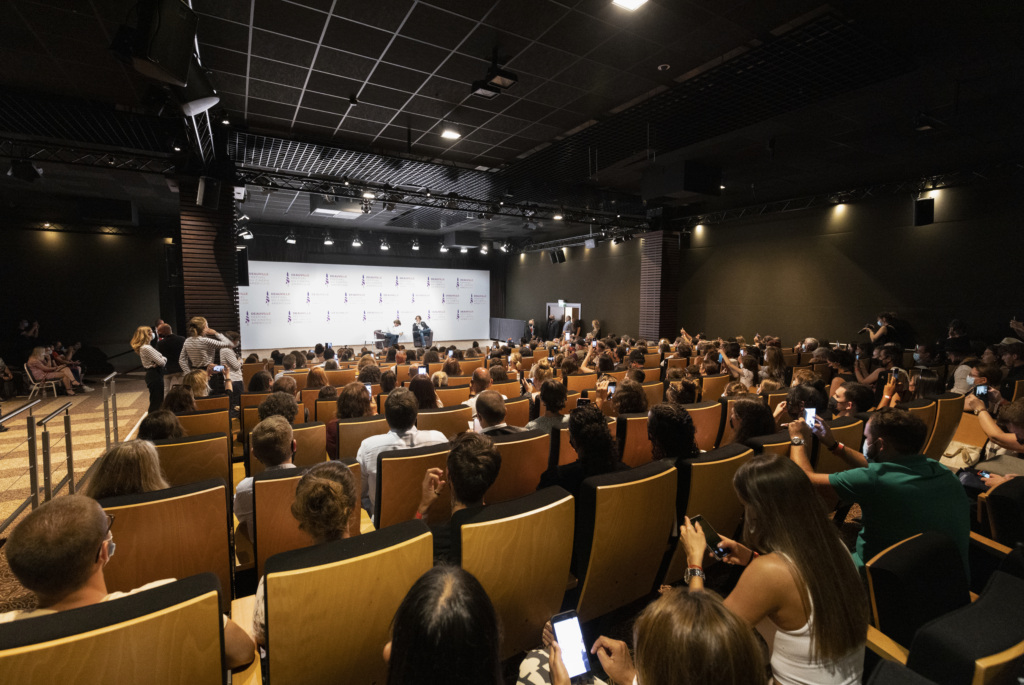“There’s no marble in me, not even water, hardly any gas”.
Is it the heaviness of the world, the proximity of death, the trials of exile, or a very personal pantheism that has given Golshifteh Farahani this precious gift of lightness, this precious value praised by the great Italian novelist Italo Calvino in his “American Lessons”?
Child prodigy of Iranian cinema, talented musician, passionate theater-enthusiast, she was revealed at a very young age in Dariush Mehrjui’s Le Poirier, and went on to make some 20 films in the course of a decade. Her first major role on the international scene in 2009 was in Asghar Farhadi’s About Elly.
Paradoxical evanescence from an actress who always embodies, resists and exudes aplomb, dignity and strength, committing her whole being.
Refusing to submit to the restrictions imposed on women, she exiled herself after filming without a hijab, alongside Leonardo DiCaprio, in Ridley Scott’s Lies of State (2008), becoming the first Iranian actress to star in a Hollywood production since the 1979 Revolution. An act of freedom that led to her banishment from her native country.
She then moved to France, where she pursued a prolific career, alternating between auteur films and international productions. In Atiq Rahimi’s Syngué sabour — Pierre de patience (2008), based on a screenplay by Jean-Claude Carrière, she reclaims her body as a submissive wife and earns a César nomination for Best New Actress; in 2016, she is Anna Karénine on stage and imposes a presence that is both radiant and combative in Jim Jarmusch’s Paterson.
With one foot in the U.S. and one foot elsewhere, each of her appearances makes its mark on viewers with its freedom and independence: she leaves it all behind in her American road trip Just Like a Woman directed by Rachid Bouchareb; she’s a schoolteacher prey to the patriarchal world in Hiner Saleem’s My Sweet Pepper Land (2013) and even a Kurdish fighter in Eva Husson’s Les Filles du soleil (2018); we also discover her as a shaven-headed sea witch in Pirates of the Caribbean: Salazar’s Revenge (2017) by Joachim Rønning, Espen Sandberg and an exceptional woman of action in Sam Hargrave’s Tyler Rake (2020).
In 2020, Manele Labidi’s Un divan à Tunis, she slipped into the role of a stubborn psychoanalyst to reveal a talent that had been somewhat neglected in her palette: comedy. In the international TV series Invasion, she takes on the role of a courageous young mother, while in the recent adaptation of the bestseller “Reading Lolita in Teheran”, she brilliantly expresses the extent to which women’s bodies were the first victims of the Iranian Revolution. This year, she will be in the Cannes Film Festival Competition in Julia Ducournau’s Alpha.
Golshifteh Farahani has embraced so many causes and so many daring figures on screen that she has become a symbol and standard-bearer for women’s freedom, but it’s body and soul that she plays out her life with intensity every day.
A cross-dressing child who braved the mullahs’ law on her bicycle to live her life, an artist in exile, a rebel posing naked to shout out her rage at being locked up, she continues to be actively involved in the women’s rights movement in Iran, notably during the demonstrations linked to the death of Mahsa Amini.
The Deauville Film Festival is extremely proud to welcome her as President of the Jury for its 51st edition.

The best of American cinema awaits you…from September 5 to 14!

